- Home
- Joseph Conrad
The Arrow of Gold Page 3
The Arrow of Gold Read online
Page 3
“Yes, Doña Rita as far as I know her is so varied in her simplicity that even that is possible,” he said. “Yes. A romantic resigned La Vallière . . . who had a big mouth.”
I felt moved to make myself heard.
“Did you know La Vallière, too?” I asked impertinently.
Mills only smiled at me. “No. I am not quite so old as that,” he said. “But it’s not very difficult to know facts of that kind about a historical personage. There were some ribald verses made at the time, and Louis XIV was congratulated on the possession—I really don’t remember how it goes—on the possession of:
“. . . de ce bec amoureux
Qui d’une oreille à l’autre va,
Tra là là.
or something of the sort. It needn’t be from ear to ear, but it’s a fact that a big mouth is often a sign of a certain generosity of mind and feeling. Young man, beware of women with small mouths. Beware of the others, too, of course; but a small mouth is a fatal sign. Well, the royalist sympathizers can’t charge Doña Rita with any lack of generosity from what I hear. Why should I judge her? I have known her for, say, six hours altogether. It was enough to feel the seduction of her native intelligence and of her splendid physique. And all that was brought home to me so quickly,” he concluded, “because she had what some Frenchman has called the ‘terrible gift of familiarity’.”
Blunt had been listening moodily. He nodded assent.
“Yes!” Mills’ thoughts were still dwelling in the past. “And when saying good-bye she could put in an instant an immense distance between herself and you. A slight stiffening of that perfect figure, a change of the physiognomy: it was like being dismissed by a person born in the purple. Even if she did offer you her hand—as she did to me—it was as if across a broad river. Trick of manner or a bit of truth peeping out? Perhaps she’s really one of those inaccessible beings. What do you think, Blunt?”
It was a direct question which for some reason (as if my range of sensitiveness had been increased already) displeased or rather disturbed me strangely. Blunt seemed not to have heard it. But after a while he turned to me.
“That thick man,” he said in a tone of perfect urbanity, “is as fine as a needle. All these statements about the seduction and then this final doubt expressed after only two visits which could not have included more than six hours altogether and this some three years ago! But it is Henry Allègre that you should ask this question, Mr. Mills.”
“I haven’t the secret of raising the dead,” answered Mills good humouredly. “And if I had I would hesitate. It would seem such a liberty to take with a person one had known so slightly in life.”
“And yet Henry Allègre is the only person to ask about her, after all this uninterrupted companionship of years, ever since he discovered her; all the time, every breathing moment of it, till, literally, his very last breath. I don’t mean to say she nursed him. He had his confidential man for that. He couldn’t bear women about his person. But then apparently he couldn’t bear this one out of his sight. She’s the only woman who ever sat to him, for he would never suffer a model inside his house. That’s why the ‘Girl in the Hat’ and the ‘Byzantine Empress’ have that family air, though neither of them is really a likeness of Doña Rita. . . You know my mother?”
Mills inclined his body slightly and a fugitive smile vanished from his lips. Blunt’s eyes were fastened on the very centre of his empty plate.
“Then perhaps you know my mother’s artistic and literary associations,” Blunt went on in a subtly changed tone. “My mother has been writing verse since she was a girl of fifteen. She’s still writing verse. She’s still fifteen—a spoiled girl of genius. So she requested one of her poet friends—no less than Versoy himself—to arrange for a visit to Henry Allègre’s house. At first he thought he hadn’t heard aright. You must know that for my mother a man that doesn’t jump out of his skin for any woman’s caprice is not chivalrous. But perhaps you do know? . . .”
Mills shook his head with an amused air. Blunt, who had raised his eyes from his plate to look at him, started afresh with great deliberation.
“She gives no peace to herself or her friends. My mother’s exquisitely absurd. You understand that all these painters, poets, art collectors (and dealers in bric-à-brac, he interjected through his teeth) of my mother are not in my way; but Versoy lives more like a man of the world. One day I met him at the fencing school. He was furious. He asked me to tell my mother that this was the last effort of his chivalry. The jobs she gave him to do were too difficult. But I daresay he had been pleased enough to show the influence he had in that quarter. He knew my mother would tell the world’s wife all about it. He’s a spiteful, gingery little wretch. The top of his head shines like a billiard ball. I believe he polishes it every morning with a cloth. Of course they didn’t get further than the big drawing-room on the first floor, an enormous drawing-room with three pairs of columns in the middle. The double doors on the top of the staircase had been thrown wide open, as if for a visit from royalty. You can picture to yourself my mother, with her white hair done in some 18th century fashion and her sparkling black eyes, penetrating into those splendours attended by a sort of bald-headed, vexed squirrel—and Henry Allègre coming forward to meet them like a severe prince with the face of a tombstone Crusader, big white hands, muffled silken voice, half-shut eyes, as if looking down at them from a balcony. You remember that trick of his, Mills?”
Mills emitted an enormous cloud of smoke out of his distended cheeks.
“I daresay he was furious, too,” Blunt continued dispassionately. “But he was extremely civil. He showed her all the ‘treasures’ in the room, ivories, enamels, miniatures, all sorts of monstrosities from Japan, from India, from Timbuctoo . . . for all I know. . . He pushed his condescension so far as to have the ‘Girl in the Hat’ brought down into the drawing-room—half length, unframed. They put her on a chair for my mother to look at. The ‘Byzantine Empress’ was already there, hung on the end wall—full length, gold frame weighing half a ton. My mother first overwhelms the ‘Master’ with thanks, and then absorbs herself in the adoration of the ‘Girl in the Hat.’ Then she sighs out: ‘It should be called Diaphanéité, if there is such a word. Ah! This is the last expression of modernity!’ She puts up suddenly her face-à-main and looks towards the end wall. ‘And that—Byzantium itself! Who was she, this sullen and beautiful Empress?’
“‘The one I had in my mind was Theodosia!’ Allègre consented to answer. ‘Originally a slave girl—from somewhere.’
“My mother can be marvellously indiscreet when the whim takes her. She finds nothing better to do than to ask the ‘Master’ why he took his inspiration for those two faces from the same model. No doubt she was proud of her discerning eye. It was really clever of her. Allègre, however, looked on it as a colossal impertinence; but he answered in his silkiest tones:
“‘Perhaps it is because I saw in that woman something of the women of all time.’
“My mother might have guessed that she was on thin ice there. She is extremely intelligent. Moreover, she ought to have known. But women can be miraculously dense sometimes. So she exclaims, ‘Then she is a wonder!’ And with some notion of being complimentary goes on to say that only the eyes of the discoverer of so many wonders of art could have discovered something so marvellous in life. I suppose Allègre lost his temper altogether then; or perhaps he only wanted to pay my mother out, for all these ‘Masters’ she had been throwing at his head for the last two hours. He insinuates with the utmost politeness:
“‘As you are honouring my poor collection with a visit you may like to judge for yourself as to the inspiration of these two pictures. She is upstairs changing her dress after our morning ride. But she wouldn’t be very long. She might be a little surprised at first to be called down like this, but with a few words of preparation and purely as a matter of art . . .’
“There were never two people more taken aback. Versoy himself confesses that he
dropped his tall hat with a crash. I am a dutiful son, I hope, but I must say I should have liked to have seen the retreat down the great staircase. Ha! Ha! Ha!”
He laughed most undutifully and then his face twitched grimly.
“That implacable brute Allègre followed them down ceremoniously and put my mother into the fiacre at the door with the greatest deference. He didn’t open his lips though, and made a great bow as the fiacre drove away. My mother didn’t recover from her consternation for three days. I lunch with her almost daily and I couldn’t imagine what was the matter. Then one day . . .”
He glanced round the table, jumped up and with a word of excuse left the studio by a small door in a corner. This startled me into the consciousness that I had been as if I had not existed for these two men. With his elbows propped on the table Mills had his hands in front of his face clasping the pipe from which he extracted now and then a puff of smoke, staring stolidly across the room.
I was moved to ask in a whisper:
“Do you know him well?”
“I don’t know what he is driving at,” he answered drily. “But as to his mother she is not as volatile as all that. I suspect it was business. It may have been a deep plot to get a picture out of Allègre for somebody. My cousin as likely as not. Or simply to discover what he had. The Blunts lost all their property and in Paris there are various ways of making a little money, without actually breaking anything. Not even the law. And Mrs. Blunt really had a position once—in the days of the Second Empire—and so. . .”
I listened open-mouthed to these things into which my West-Indian experiences could not have given me an insight. But Mills checked himself and ended in a changed tone.
“It’s not easy to know what she would be at, either, in any given instance. For the rest, spotlessly honourable. A delightful, aristocratic old lady. Only poor.”
A bump at the door silenced him and immediately Mr. John Blunt, Captain of Cavalry in the Army of Legitimity, first-rate cook (as to one dish at least), and generous host, entered clutching the necks of four more bottles between the fingers of his hand.
“I stumbled and nearly smashed the lot,” he remarked casually. But even I, with all my innocence, never for a moment believed he had stumbled accidentally. During the uncorking and the filling up of glasses a profound silence reigned; but neither of us took it seriously—any more than his stumble.
“One day,” he went on again in that curiously flavoured voice of his, “my mother took a heroic decision and made up her mind to get up in the middle of the night. You must understand my mother’s phraseology. It meant that she would be up and dressed by nine o’clock. This time it was not Versoy that was commanded for attendance, but I. You may imagine how delighted I was. . . .”
It was very plain to me that Blunt was addressing himself exclusively to Mills: Mills the mind, even more than Mills the man. It was as if Mills represented something initiated and to be reckoned with. I, of course, could have no such pretensions. If I represented anything it was a perfect freshness of sensations and a refreshing ignorance, not so much of what life may give one (as to that I had some ideas at least) but of what it really contains. I knew very well that I was utterly insignificant in these men’s eyes. Yet my attention was not checked by that knowledge. It’s true they were talking of a woman, but I was yet at the age when this subject by itself is not of overwhelming interest. My imagination would have been more stimulated probably by the adventures and fortunes of a man. What kept my interest from flagging was Mr. Blunt himself. The play of the white gleams of his smile round the suspicion of grimness of his tone fascinated me like a moral incongruity.
So at the age when one sleeps well indeed but does feel sometimes as if the need of sleep were a mere weakness of a distant old age, I kept easily awake; and in my freshness I was kept amused by the contrast of personalities, of the disclosed facts and moral outlook with the rough initiations of my West-Indian experience. And all these things were dominated by a feminine figure which to my imagination had only a floating outline, now invested with the grace of girlhood, now with the prestige of a woman; and indistinct in both these characters. For these two men had seen her, while to me she was only being “presented,” elusively, in vanishing words, in the shifting tones of an unfamiliar voice.
She was being presented to me now in the Bois de Boulogne at the early hour of the ultra-fashionable world (so I understood), on a light bay “bit of blood” attended on the off side by that Henry Allègre mounted on a dark brown powerful weight carrier; and on the other by one of Allègre’s acquaintances (the man had no real friends), distinguished frequenters of that mysterious Pavilion. And so that side of the frame in which that woman appeared to one down the perspective of the great Allée was not permanent. That morning when Mr. Blunt had to escort his mother there for the gratification of her irresistible curiosity (of which he highly disapproved) there appeared in succession, at that woman’s or girl’s bridle-hand, a cavalry general in red breeches, on whom she was smiling; a rising politician in a grey suit, who talked to her with great animation but left her side abruptly to join a personage in a red fez and mounted on a white horse; and then, some time afterwards, the vexed Mr. Blunt and his indiscreet mother (though I really couldn’t see where the harm was) had one more chance of a good stare. The third party that time was the Royal Pretender (Allègre had been painting his portrait lately), whose hearty, sonorous laugh was heard long before the mounted trio came riding very slowly abreast of the Blunts. There was colour in the girl’s face. She was not laughing. Her expression was serious and her eyes thoughtfully downcast. Blunt admitted that on that occasion the charm, brilliance, and force of her personality was adequately framed between those magnificently mounted, paladin-like attendants, one older than the other but the two composing together admirably in the different stages of their manhood. Mr. Blunt had never before seen Henry Allègre so close. Allègre was riding nearest to the path on which Blunt was dutifully giving his arm to his mother (they had got out of their fiacre) and wondering if that confounded fellow would have the impudence to take off his hat. But he did not. Perhaps he didn’t notice. Allègre was not a man of wandering glances. There were silver hairs in his beard but he looked as solid as a statue. Less than three months afterwards he was gone.
“What was it?” asked Mills, who had not changed his pose for a very long time.
“Oh, an accident. But he lingered. They were on their way to Corsica. A yearly pilgrimage. Sentimental perhaps. It was to Corsica that he carried her off—I mean first of all.”
There was the slightest contraction of Mr. Blunt’s facial muscles. Very slight; but I, staring at the narrator after the manner of all simple souls, noticed it; the twitch of a pain which surely must have been mental. There was also a suggestion of effort before he went on: “I suppose you know how he got hold of her?” in a tone of ease which was astonishingly ill-assumed for such a worldly, self-controlled, drawing-room person.
Mills changed his attitude to look at him fixedly for a moment. Then he leaned back in his chair and with interest—I don’t mean curiosity, I mean interest: “Does anybody know besides the two parties concerned?” he asked, with something as it were renewed (or was it refreshed?) in his unmoved quietness. “I ask because one has never heard any tales. I remember one evening in a restaurant seeing a man come in with a lady—a beautiful lady—very particularly beautiful, as though she had been stolen out of Mahomet’s paradise. With Doña Rita it can’t be anything as definite as that. But speaking of her in the same strain, I’ve always felt that she looked as though Allègre had caught her in the precincts of some temple . . . in the mountains.”
I was delighted. I had never heard before a woman spoken about in that way, a real live woman that is, not a woman in a book. For this was no poetry and yet it seemed to put her in the category of visions. And I would have lost myself in it if Mr. Blunt had not, most unexpectedly, addressed himself to me.
“I told you that ma
n was as fine as a needle.”
And then to Mills: “Out of a temple? We know what that means.” His dark eyes flashed: “And must it be really in the mountains?” he added.
“Or in a desert,” conceded Mills, “if you prefer that. There have been temples in deserts, you know.”
Blunt had calmed down suddenly and assumed a nonchalant pose.
“As a matter of fact, Henry Allègre caught her very early one morning in his own old garden full of thrushes and other small birds. She was sitting on a stone, a fragment of some old balustrade, with her feet in the damp grass, and reading a tattered book of some kind. She had on a short, black, two-penny frock (une petite robe de deux sous) and there was a hole in one of her stockings. She raised her eyes and saw him looking down at her thoughtfully over that ambrosian beard of his, like Jove at a mortal. They exchanged a good long stare, for at first she was too startled to move; and then he murmured, “Restez donc.” She lowered her eyes again on her book and after a while heard him walk away on the path. Her heart thumped while she listened to the little birds filling the air with their noise. She was not frightened. I am telling you this positively because she has told me the tale herself. What better authority can you have . . .?” Blunt paused.
“That’s true. She’s not the sort of person to lie about her own sensations,” murmured Mills above his clasped hands.
“Nothing can escape his penetration,” Blunt remarked to me with that equivocal urbanity which made me always feel uncomfortable on Mills’ account. “Positively nothing.” He turned to Mills again. “After some minutes of immobility—she told me—she arose from her stone and walked slowly on the track of that apparition. Allègre was nowhere to be seen by that time. Under the gateway of the extremely ugly tenement house, which hides the Pavilion and the garden from the street, the wife of the porter was waiting with her arms akimbo. At once she cried out to Rita: ‘You were caught by our gentleman.’

 Heart of Darkness
Heart of Darkness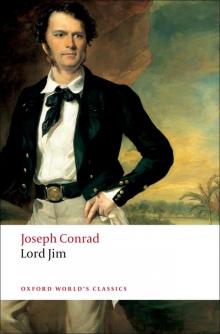 Lord Jim
Lord Jim The Nigger of the Narcissus (Echo Library)
The Nigger of the Narcissus (Echo Library) Victory (Dover Thrift Editions)
Victory (Dover Thrift Editions) Secret Agent
Secret Agent Nostromo
Nostromo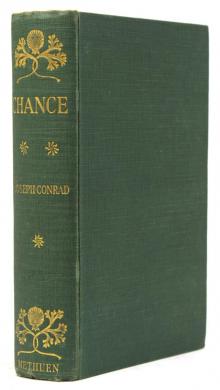 Chance: A Tale in Two Parts
Chance: A Tale in Two Parts Youth
Youth Almayer's Folly
Almayer's Folly The Heart of Darkness and the Secret Sharer
The Heart of Darkness and the Secret Sharer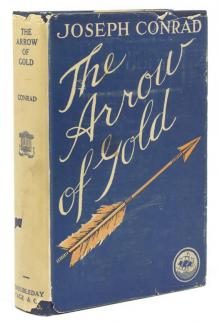 The Arrow of Gold: A Story Between Two Notes
The Arrow of Gold: A Story Between Two Notes The Rescue: A Romance of the Shallows
The Rescue: A Romance of the Shallows The Point Of Honor: A Military Tale
The Point Of Honor: A Military Tale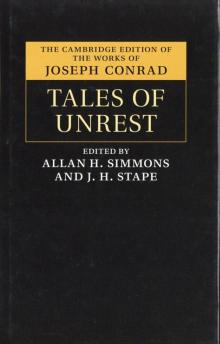 Tales of Unrest
Tales of Unrest Under Western Eyes
Under Western Eyes Gaspar Ruiz
Gaspar Ruiz A Set of Six
A Set of Six Heart of Darkness and the Congo Diary (Penguin Classics)
Heart of Darkness and the Congo Diary (Penguin Classics) Heart of Darkness and Selected Short Fiction
Heart of Darkness and Selected Short Fiction Typhoon
Typhoon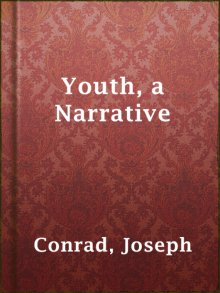 Youth, a Narrative
Youth, a Narrative Tomorrow
Tomorrow The Arrow of Gold
The Arrow of Gold The Shadow Line: A Confession
The Shadow Line: A Confession The Rescue
The Rescue Victory (Echo Library)
Victory (Echo Library) The Brute
The Brute Romance
Romance A Personal Record
A Personal Record Lord Jim: A Tale
Lord Jim: A Tale Heart of Darkness and Selected Short Fiction (Barnes & Noble Classics Series)
Heart of Darkness and Selected Short Fiction (Barnes & Noble Classics Series) Within the Tides
Within the Tides The Secret Sharer and Other Stories
The Secret Sharer and Other Stories Falk
Falk Heart of Darkness and The Secret Sharer
Heart of Darkness and The Secret Sharer Chance
Chance An Anarchist
An Anarchist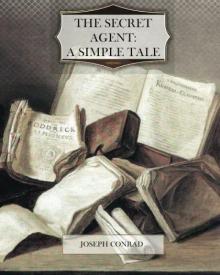 The Secret Agent: A Simple Tale
The Secret Agent: A Simple Tale The Secret Agent
The Secret Agent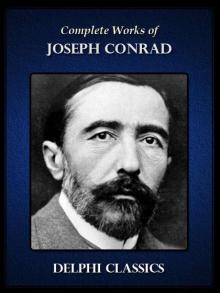 Complete Works of Joseph Conrad (Illustrated)
Complete Works of Joseph Conrad (Illustrated) Heart of Darkness and the Congo Diary
Heart of Darkness and the Congo Diary Notes on Life & Letters
Notes on Life & Letters Typhoon (Single Story)
Typhoon (Single Story)